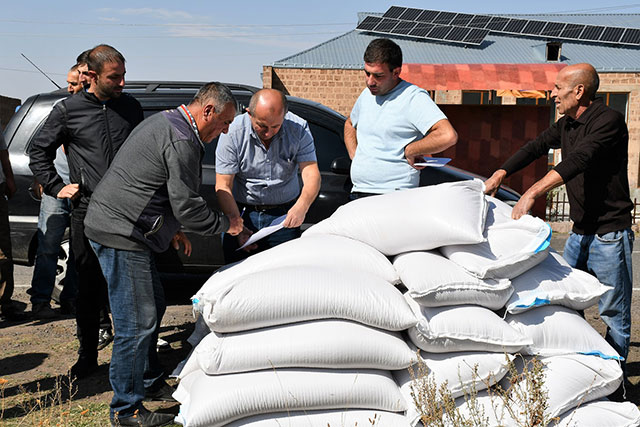8 October 2022 – The most cultivated grain in Armenia is wheat, still its production has been steadily declining in the recent years. The war in Ukraine in particular has disrupted traditional logistics routes to and from Armenia impeding export and import potential of the country.
In view of this, the Food and Agriculture Organization of the United Nations (FAO) continues delivering humanitarian aid to the most vulnerable smallholder farmers in Gegharkunik, Shirak and Syunik regions that have been affected the most by the supply chain disruption caused by the conflict. The activity is financially supported by FAO and the UN Joint SDG Fund.
As part of this effort, FAO already distributed 151 tonnes of winter wheat seeds in Gegharkunik (Chambarak and Vardenis communities) and Shirak (Ani, Akhuryan, Artik, Amasia and Ashotsk communities) regions. Along with that, beneficiary farmers are also receiving knowledge on the cultivation of winter wheat seeds from FAO leaflets and consultations.
In total, 301 tonnes of winter wheat seeds will be delivered to 1 078 vulnerable beneficiaries in the three regions, each of which will receive up to 300 kg aid by 10 October.
Read also
Food insecurity in Armenia is driven by financial hardships: the economic impact of the COVID-19 pandemic, consequences of the war in and around Nagorno Karabakh and the war in Ukraine that altogether put additional strain on marginally food secure households. The Armenian agricultural sector is particularly impacted by the latter, causing disruptions of fuel, seeds, pesticides and fertilizer supplies which triggered a significant increase in the price of these inputs for agriculture production.
In this context, the Government of Armenia has requested emergency support from FAO to assist with import of high quality wheat seeds to mitigate the risks of shortages in wheat supplies. This project aims to address this challenge with support to the most vulnerable smallholder farmers with high quality wheat seeds for replanting and necessary technical advisory support on improved wheat production and management practices.
The target beneficiaries from Gegharkunik, Shirak, and Syunik regions have been identified through detailed need analysis. The detailed lists and specifications of wheat varieties and quantity to be procured have been selected by FAO in collaboration with the Ministry of Economy and the Centre for Agricultural Research and Certification State Non-Commercial Organization of the Ministry.
Food and Agriculture Organization of the United Nations


























































